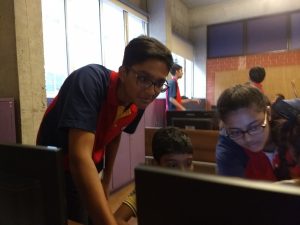- Barbodhan
- Tunda
- Umra
The service program required us to select a particular sport/subject and teach these underprivileged children that sport/subject. The activity was for 3 weekends, 6 days in total where we had to come for 2 hours every day with a pre-planned syllabus. I chose to teach ICT because I’m really good with computers, and I had also taken ICT for my IGCSE’s. I was in charge of the ICT team.
The curriculum we planned included:
- identifying the basic components of a computer
- google maps
- word document editing
- presentation making
- typing games
- art tools (Tux Paint)
LO2:
There were a bunch of difficulties that we faced during this project. Some smaller problems included there being fewer working computers compared to the students and the unavailability of the ICT lab one day. However, one of the bigger challenges that we faced was that we couldn’t converse that easily with the children. Their different dialect often caused some difficulties in communication. Making the children understand some basic concepts of computers was a little difficult and took up some time. In order to overcome this difficulty we tried to use no English terminologies and tried to speak close to their dialect so that we could better connect with them, and they with us, and we succeeded. This strategy made the classes much more productive, engaging, and fruitful, and we were able to warm our hearts with the excited eyes of the children.
LO3:
It was the school which organized the service program, however, it was the responsibility of subject-wise leaders (team in-charge) to plan the syllabus for the subject. This planning was rather complicated as we had to create a syllabus that was appropriate for the level of understandings of the children, who were varied by age and background knowledge of computers. We couldn’t keep the syllabus too simple as that wouldn’t challenge them and teach them a lot. So we decided on the aforementioned syllabus, which we found to be appropriate for them, and be more applicable to their real life. For example, we taught them use of google maps, which they can use to easily find their way in an unknown place. We also showed them a street view of their area and they were ecstatic, jumping up and almost shouting as they found familiar places on the screens. I am usually organized with my work, however, it was a little difficult to fit the 2 hours and planning-time into my schedule (which was already quite packed with SAT practice).
LO4:
The commitment was difficult due to the fact that the service sessions were on weekends (when I used to practice SAT), and they were two hours long. So I had to reschedule and compromise some of my studies, which was frustrating to a certain extent. However, the enthusiastic children made the compromise worth it. Persistency was mainly difficult because there was some amount of repetition. Every weekend there were a lot of new children who weren’t there in the previous class, so we had to repeat some basics and some activities. At times this felt monotonous and a little boring. However, often some children took new approaches in doing the same things, which was quite exciting for us.
LO5:
This wouldn´t have been possible if it weren´t for the group of fountainhead students working together. We divided the number of children into groups and assigned responsibilities to students to help and guide particular groups of children. Whereas, I and a few other students focused on planning and organizing the classes, going around to check if every child is being able to learn properly. This assignment of responsibility and the working of every component of the class was quite fascinating because it seemed as if the class was like a body with different organs working together to keep it alive.

LO6:
The issue was a lack of knowledge in the children regarding the proper use of computers. As part of the next generation, these children will grow in a world of technology and a lack of familiarity with technology is likely to cause them difficulties of fitting in and finding jobs. Technology is now globally a huge part of everyone’s life, and, in fact, it has now become necessary for survival for most people. Through this service session, we taught the children about and the usage of technology. Realising and working on this global issue helped me see the joy in giving to others, and I realized how the knowledge that I gave them might help them in their lives later.
LO7:
The children had very humble backgrounds. They did not have a very facilitated, high-quality education. In regards to this, I believed that we, the students of fountainhead, had to be sure not to seem very intimidating as that would actually prevent them from learning a lot. In order to create an understanding, we had to be sure not to seem too proud of ourselves as not only would no one be able to properly learn with that sort of teachers, but that would also make the children feel vulnerable, out of place, and uncomfortable. So I ensured that the ICT team was not rude towards, frustrated by, or unwilling to help any of the children.

